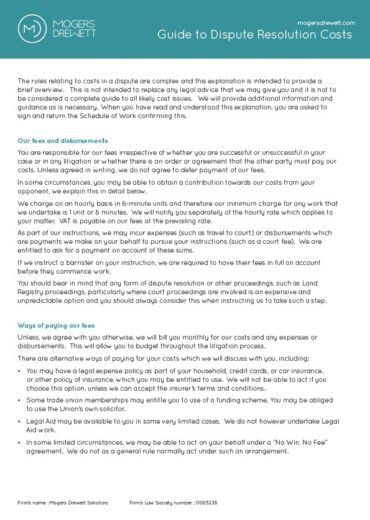Expert advice on property disputes
Home should be a calm, safe place, so we understand that property disputes can be particularly difficult and emotional. Our skilled property dispute solicitors can give you all the information you need to help you resolve issues as efficiently as possible.
Property disputes are typically disputes over the ownership of a property or the way the property is being used. Additionally, they can involve disputes between parties over the purchase or sale of property and the covenants (rules that state what can and cannot be done on the land). It is important to seek advice quickly so that you can find a solution and preserve the relationship you have with your neighbours and anyone else involved.
Our property dispute services include:
Boundary disputes
Boundary disputes arise between owners or occupiers of neighbouring properties. Sometimes, but not always, a boundary dispute will arise when one party constructs a fence, wall or building in a position that highlights that the two neighbours have different views as to where the boundary lies. Our team can help you to resolve the dispute by establishing the boundary from the conveyancing documentation and title deeds.
Rights of way
Rights exercised over a neighbouring piece of land or property for the benefit of another often called ‘easements’, exist in a variety of forms including:
- a right of way allowing a person to cross the land of an adjoining landowner
- a right for drainage pipes or other service media to pass over or under land
- rights of access for maintenance purposes.
- a right to receive light.
Disputes concerning rights of way tend to start when one party assumes the land they are accessing is either within their boundary, publicly owned or they have permission to access. The dispute can become more complex if the assumed right of way has been accessed for an extended period.
Our team of experts includes specialist Jonathan Cheal, one of the country’s leading practitioners in rights of way and public access disputes. He’s here to give you the guidance you need to find a clear way forward
Nuisance
It can be difficult to determine what is a ‘nuisance’ as people will have different sensitivities and what disturbs one neighbour may not be a problem to the other.
To be a legal nuisance the problem must cause a significant disturbance to the complainant’s property over a reasonable length of time rather than a one-off or occasional occurrence.
Breach of covenant
Covenants are binding conditions that are written into a property’s deeds or contract by a seller to determine what a homeowner can or cannot do. If you own a property and unknowingly (or otherwise) breach a restrictive covenant, you could be forced to undo any work done and return the property or land to its previous condition. This could be in relation to any number of things, such as access rights, building rights or even preventing a business being run from the property.
Trespass
Trespass is the legal term for unlawful entry on to another person’s property. If expressed or written permission is not given by the landowner, then anyone who is caught on this land without permission is trespassing.
Contract disputes on sale/purchase of land
Sometimes disputes may arise in relation to the contracts, for example:
- The other party may fail to complete on the sale or purchase of a property
- The seller may have made a misrepresentation about the property you purchased
- The other party may fail to comply with their obligations under a Pre-emption (a right of first refusal) or Option Agreement (right to require the landowner to sell the land to them)
- Our dispute resolution solicitors are specialists in this area and can use their combined expertise in both property law and dispute resolution to assess your situation and let you know what your options are.
Landlord & Tenant Disputes
Landlord and tenants have different priorities, so it’s inevitable that from time to they need to seek legal advice when they don’t see eye to eye.
A dispute between a landlord and tenant often revolves around a breach in the terms agreed of the lease, a conflict of interest between the parties or if the landlord requires possession of the property. These disagreements can be incredibly stressful and time consuming for all involved.
Our team experienced property dispute lawyers can provide regularly advise landlords and tenant of both commercial and residential premises, providing sensible and pragmatic advice that will help to achieve the best possible outcome. We will always try to resolve matters through negotiation, mediation, or arbitration, but if that fails, we will be there to support you through a claim or defence in the civil courts or tribunals.
Next steps: get in touch
If you’re unable to resolve a property dispute contact our expert team on: 0800 533 5349 or enquiries@mogersdrewett.com
Meet the team
Frequently asked questions
Leasehold enfranchisement is the process you go through to extend your lease.
This is the process you go through to purchase a share of the freehold.
Rectification means an alteration that involves the correction of a mistake that detrimentally affects the title of a registered owner.
Adverse possession is a legal principle whereby a person who does not have legal title can become the owner of land by being in possession of it for long enough to oust the title of the true owner.
An easement is the right to use and/or enter onto someone else’s property without being the owner. It is best explained in the right of way which one landowner may enjoy over the land of another.
The owner of the land over which the right of way passes cannot alter its route or insist on its removal without the consent of the person who benefits from the right, for example the neighbour.
Yes. A landowner can install a gate across a right of way, as long as the owner of the right can still use it in the same manner as before.
You will want your boundary dispute to be resolved within 12 years. If boundary disputes go on too long, there’s a risk that someone else could gain ownership of your property.





